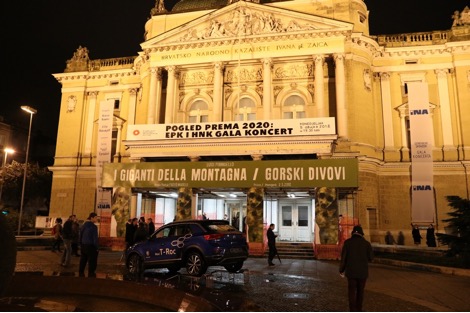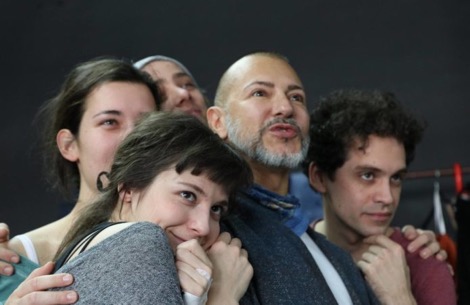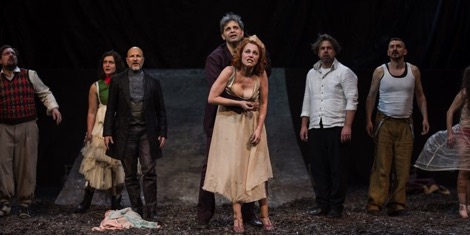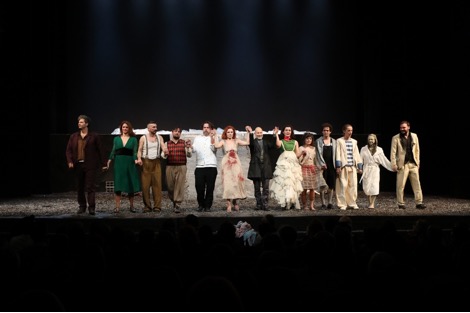The Croatian city of Rijeka will be the European Capital of Culture in 2020 and a theatre program is envisaged especially for the occasion. All its details will be announced this Fall. At this moment, though, some of the included titles are already known: Burning Water – a ballet to be choreographed by Andonis Foniadakis, focusing on the contrasting nature of water and on the reactions and adjustments of the human body to the presence of water, not forgetting the impact of water on the human soul; Tristan and Isolde – a romantic opera in three acts, to be directed by the prize-winning contemporary theatre director Anne Bogart – a central piece of work in the comprehensive reformation opus of Richard Wagner; and All the Good by Needcompany – a love story with a two-fold autobiographical background based on nowadays, when Europe sacrificed its values, with the dominant emotion being hatred.

Croatian National Theatre. Photo Credit: Croatian National Theatre.
And one production already had its premiere (in February 2018): The Mountain Giants, by Luigi Pirandello, directed by Paolo Magelli. A unique, multilingual theatre project, it’s a co-production of five national minority European theatres: the Rijeka CNT Italian Drama, the German Theatre of the City of Timisoara (Romania), Slovene Permanent Theatre in Trieste (Italy), National Institution Albanian Theatre, Skopje (Macedonia) and the Hungarian Theatre Kosztolányi Dezső, Subotica (Serbia). The production is a central part of the (Re)discovering Europe program, the first project of direct co-operation of the CNT “Ivan pl. Zajc” and the ECoC 2020, and the first Rijeka CNT project to be co-financed by the European Union’s Creative Europe program.
According to Paolo Magelli, the essence of this interesting and difficult project is in that language is not a barrier but freedom. Going back to the beginning – the emergence of the idea to gather these five national minority theatres and five different voices of the cultural reality – he emphasizes that: “Multilingualism is an intellectual being with different sounds; yet it is the very diversity of these sounds that defines freedom.” Actually, after ending his term as the general manager of Teatro Metastasio Stabile della Toscana in Italy and his participation in a ECoC Rijeka 2020 flagship project The games of the powerful, together with the Croatian theatre director Oliver Frljić, Magelli came up with the idea of creating an organization of national minority theatres that could expand in the future and, thus, create a European co-production network.
“It’s obvious to me that minorities in Europe are a ‘reality that is unprotected and weak’ and that their existence is less and less tolerated by the majority, Magelli says. It’s also obvious that their preservation is a battle for saving democracy. The atmosphere of The Mountain Giants, through which Pirandello in 1936 predicts the end of art and the end of theatre, seems to be experiencing its solemn rerun in the Europe of today. Its giants are again those who keep the reins of financial policy globally, deciding on, among other things, decreasing the funding of culture.”
In this context, a book comes to mind: Authenticity and Legitimacy in Minority Theatre: Constructing Identity, edited by Madelena Gonzalez and Patrice Brasseur (first published in 2010 by Cambridge Scholars Publishing). In the introduction Gonzales writes: “Contemporary theatre is one of the best ways for ethno-cultural minorities to express themselves, whether they be of indigenous origin or immigrants. It is often used to denounce social injustice and discrimination and, more generally, it helps to air questions debated in the wider community. It may also express itself thanks to the staging of collective memory, for it constitutes a privileged space for the exploration of the trauma of the past (colonial, for example), as well as providing a means of effecting the reconfiguration of a new identity, or of articulating an uneasiness about that identity. Should minority theatre increase its visibility in relation to the mainstream, or, on the contrary, remain on the margins and assert its specificity? This question is at the centre of French-Canadian experience, for example, but also applies to other postcolonial societies, in Europe and elsewhere.”
“In order to maintain its cultural authenticity, Gonzales continues asking questions, should this type of theatre distinguish itself from a multiculturalism that runs the risk of political and social recuperation? If it is unable to resist the model proposed by globalization and widespread cultural dissemination, will it lose its legitimacy? Can, and should there be, a form of popular art at the service of the community? The term “minority” raises questions that will be examined by the articles collected in this volume. What is the definition of a minority? Does this term refer to experimental and avant-garde art forms as well as to ethno-cultural drama? Contemporary theatre is characterized by an aesthetics of hybridity – in what measure is this the case for theatre outside the mainstream? The exploration of this kind of theatre necessitates an examination of the very concept of theatre per se. Since the development of the electronic media as the privileged vector of culture, has not the theatrical genre itself become a minority art form?”
“The re-discovery of authenticity through the staging of minority experience may confer a sense of identity on certain cultural products, creating a dramatic narrative that runs parallel to the mainstream” – writes Madelena Gonzales.
The Mountain Giants, the last work of Luigi Pirandello, is his masterpiece that remained unfinished. It is a contemporary fairy tale that pulls down barriers between actors and spectators. The story follows a touring company of actors that, in their wandering, arrives at a non-defined place and time into a space that is on the border between reality and non-reality, where a fairy called Bad Luck lives. The production is performed in Italian, German, Slovene, Albanian and Hungarian (with subtitles in Croatian and Italian).

The Mountain Giants. Photo Credit: Croatian National Theatre.
The fact that the production was created in co-operation with the five European minority theaters gives this new interpretation of Mountain Giants a political dimension that is very relevant today. By placing minorities in the context of the play, Magelli investigates the relationship between small and large, minority and majority, big and small languages, powerful and marginalized. He problematizes the position of culture and theatre in today’s Europe, when they go through a kind of agony.
In the play the actress Ilse is married to a rich groom but her former life is still being watched: she was looking for a young poet who showed her the beginning of his new piece The Fable of the Changed Son. When the work was completed, she agreed to play in it but still rejected the poet’s love. He was killed and the desperate Ilse persuaded her husband to put all their property into a theatrical company that would tell the story of the changed son. However, people did not understand the piece, money was lost and the company split. The rest of the actors, joined by the impoverished count, then travel to the hills where they expect to be given the opportunity to repeat the work once more. And so they find themselves next to an abandoned house, where unusual events begin. With the help of the giants they give a performance, but the audience is not satisfied.

The Mountain Giants . Photo Credit: Croatian National Theatre.
The end is left to the director’s imagination. In the interpretation of Paolo Magelli and dramatist Željka Udovičić Pleština in the final scene Ilse dies – which is a symbolic death of art and culture. The dream elements of Pirandello’s play (the magical events in the house – where dreams, dolls and objects come alive) are emphasized by the scenery of Aleksandra Ana Buković and Lorenzo Banci. They cover the stage with sawdust and place an elastic springboard in the middle of the stage space, which becomes an interesting dynamic element of the performance. The shape of Dalibor Fugosic’s light was particularly pronounced in the dream scenes. Manuela Paladin Sabanovic’s costumes range from emphasizing the femininity of individual characters to imaginative creations.

The Mountain Giants. Photo Credit: Croatian National Theatre.
The greatest value of this show is in the gathering of actors from different countries who speak Pirandello’s sentences in their own languages and bring in the wealth of their own cultures and different acting experiences. In the role of the passionate and mentally unstable Ilse is the excellent Valentina Banci, while her calm and rational husband is embodied by Mirko Soldano. Giuseppe Nicodemo is Cromo, the Character actor, Daniel Dan Malalan – Spizzi, the Young actor and Xhevdet Jashari – Battaglia, an Actor. Aniko Kiss is Diamante, Cotrone is Mauro Malinverno, Boris Kucov is a Dwarf, Nobleman Zeqiri is Duccio Doccia, La Sgricia is Doroteja Nadrah, Milordino is Richard Hladnik, Mara-Mara and Maddalena are played by Silvia Török and Ivna Bruck is in the role of a Woman. Although they speak different languages, actors are actually understandable to everyone, because the language of theatre and emotion is universal.

The Mountain Giants. Photo Credit: Croatian National Theatre.
With this performance, Rijeka as ECoC 2020 has entered the Port of Diversity, as a multicultural city with CNT Italian Drama – the only theatre performing in the Italian language outside of Italy.
Kim Cuculić (1972) is a culture columnist, journalist, theatre critic and editor in Novi list, daily paper from Croatia, the city of Rijeka. Apart from Novi list, she has been co-operating with a number of other Croatian newspapers and magazines. She was a member of the editorial board of Rival, a literature magazine that was published in Rijeka. In 2013. she published a book of theatre criticism Peti red, parter/The Fifth Row, Stalls. She is the member of the Croatian Association of Theatre Critics and Theatre Scholars, a member of the Croatian Journalist Association and a member of ITI and A.I.C.T.

European Stages, vol. 13, no. 1 (Spring 2019)
Editorial Board:
Marvin Carlson, Senior Editor, Founder
Krystyna Illakowicz, Co-Editor
Dominika Laster, Co-Editor
Kalina Stefanova, Co-Editor
Editorial Staff:
Joanna Gurin, Managing Editor
Maria Litvan, Assistant Managing Editor
Advisory Board:
Joshua Abrams
Christopher Balme
Maria Delgado
Allen Kuharsky
Bryce Lease
Jennifer Parker-Starbuck
Magda Romańska
Laurence Senelick
Daniele Vianello
Phyllis Zatlin
Table of Contents:
- Introductory Note by Kalina Stefanova.
- “Andrzej Tadeusz Wirth (1927 – 2019) – White on White” by Krystyna Illakowicz.
- Lithuanian Marriage in Warsaw or The Last Production of the Great Eimuntas Nekrošius by Artur Duda.
- “My, Żydzi polscy [We, Polish Jews]”: A Review of Notes from Exile by Dominika Laster.
- A Report on the State of Our Society, According to Jiří Havelk in The Fellowship of Owners at VOSTO5, Prague, and Elites, at the Slovak National Theater, Bratislava by Jitka Šotkovská.
- About Life as Something We Borrow. On the Stages of Pilsen (In the 26 th edition of the International Theatre Festival There) by Kalina Stefanova.
- Redesigning Multiculturalism or Japanese Encounters in Sibiu, Romani, The Scarlet Princess, written and directed by Silviu Purcărete, inspired by Tsuruya Namboku IV’s Sakura Hime Azuma Bunshô by Ion M. Tomuș.
- About Globalization: A “Venice Merchant” on Wall Street, at the Hungarian Theatre of Cluj in Romania by Maria Zărnescu.
- The Patriots, Mary Stuart and Ivanov and the Rise of the Drama Ensemble of the National Theatre in Belgrade by Ksenija Radulović.
- The Unseen Theatre Company or How to See Beyond the Visible: The Shadow of My Soul and the Theatre of Velimir Velev by Gergana Traykova.
- Multilingual Pirandello, Understandable to Everyone: The Mountain Giants at the Croatian National Theatre “Ivan pl. Zajc”, Rijeka by Kim Cuculić.
- The return of the repressed: the ghosts of the past haunt Barcelona’s stages by Maria M. Delgado.
- A poetics of memory on the Madrid stage (2018) by Maria M. Delgado.
- The Danish National Theatre System and the Danish National School of Performing Arts: December in Copenhagen 2018 by Steve Earnest.
- Towards a Theatre of Monodrama in Turkey 1 by Eylem Ejder.
- Where Is Truth? Justiz by Friedrich Dürrenmatt, adapted and directed by Frank Castorf at the Schauspielhaus Zürich by Katrin Hilbe.
- Report from Vienna by Marvin Carlson.
www.EuropeanStages.org
europeanstages@gc.cuny.edu
Martin E. Segal Theatre Center:
Frank Hentschker, Executive Director
Marvin Carlson, Director of Publications
©2019 by Martin E. Segal Theatre Center
The Graduate Center CUNY Graduate Center
365 Fifth Avenue
New York NY 10016
European Stages is a publication of the Martin E. Segal Theatre Center ©2019
Martin E. Segal Theatre Center:
Frank Hentschker, Executive Director
Marvin Carlson, Director of Publications
©2019 by Martin E. Segal Theatre Center
The Graduate Center CUNY Graduate Center
365 Fifth Avenue
New York NY 10016
European Stages is a publication of the Martin E. Segal Theatre Center ©2019



